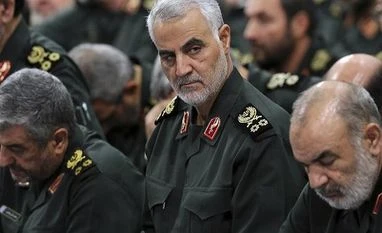Soleimani killing: Israel holds security talks, braces for fallout
Netanyahu broke off an official visit to Greece and flew home, expressing support for the overnight US strike that killed General Qasem Soleimani in Baghdad
)
File Photo: Qassem Soleimani, center, attending a meeting in Tehran, Iran
Israel held emergency security talks Friday and Prime Minister Benjamin Netanyahu cut short a foreign visit as the Jewish state braced itself for fallout from the assassination of a top Iranian military commander in a US air strike.
Defence Minister Naftali Bennett chaired a meeting of security chiefs, including the heads of the army, the National Security Council and the Mossad intelligence agency, his office said.
Netanyahu broke off an official visit to Greece and flew home, expressing support for the overnight US strike that killed General Qasem Soleimani in Baghdad.
"Just as Israel has the right of self-defence, the United States has exactly the same right," Netanyahu said as he boarded his flight from Athens.
"President (Donald) Trump deserves all the credit for acting swiftly, forcefully and decisively," he said. "Israel stands with the United States in its just struggle for peace, security and self-defence." On the ground, the Israeli army closed Mount Hermon ski resort on the annexed Golan Heights, a disputed territory which borders Syria and Lebanon.
Also Read
Fighters of the Iran-backed Lebanese Shiite group Hezbollah, Israel's bitter foe with which it fought a devastating war in 2006, are deployed on the other side of the armistice line.
Although an Israeli military source said there were no new troop deployments, tanks and soldiers sealed off access to the Hermon site, while an AFP correspondent also spotted a battery of the Iron Dome missile defence system.
The heightened state of alert came after Iran's supreme leader Ayatollah Ali Khamenei vowed "severe revenge" for Soleimani's killing, the biggest escalation yet in a feared proxy war between Iran and the US on Iraqi soil.
He was echoed by the leader of Hezbollah.
"Meting out the appropriate punishment to these criminal assassins... will be the responsibility and task of all resistance fighters worldwide," Hassan Nasrallah said.
Soleimani, head of the Quds Force in Iran's elite Revolutionary Guards, had long also been in Israel's sights for his alleged links to attacks on Israeli and Jewish targets worldwide.
Among them, Israel's Haaretz daily said, were the 1994 bombing of a Jewish community centre in Buenos Aires and an attack on an Israeli tour bus in Burgas, Bulgaria in 2012.
Yossi Mansharof, an expert on Iran and Shiite militias at the Jerusalem Institute for Strategy and Security, said Hezbollah was unlikely to seek a showdown in Lebanon given the country's current economic and political crisis.
Hezbollah's forces in Syria, however, could make a move, he said.
"Hezbollah can act against Israel from the Syrian side," he told AFP. "They would not dare to drag Lebanon into a military escalation." In addition to Hezbollah forces in Syria, the Quds Force and "many, many militias which Soleimani has fostered" are also stationed in the war-torn country, he pointed out.
He said Hezbollah had a worldwide network of operatives, and an attack on American officials, high-ranking military officers or other interests was also possible. The powerful organisation has boasted in the past that it "can target New York and Washington", Mansharof said.
In the Gaza Strip, the Palestinian Islamist movement Hamas which rules the territory condemned Soleimani's killing but did not make any overt threat.
"Hamas sends its condolences to the Iranian leadership and people," it said in a statement. "Hamas condemns this American crime which raises tension in the region."
The leftist Popular Front for the Liberation of Palestine said the Baghdad strike called for "a coordinated, comprehensive and continuous response from resistance forces" against "American and Zionist interests".
More From This Section
Don't miss the most important news and views of the day. Get them on our Telegram channel
First Published: Jan 03 2020 | 8:25 PM IST


